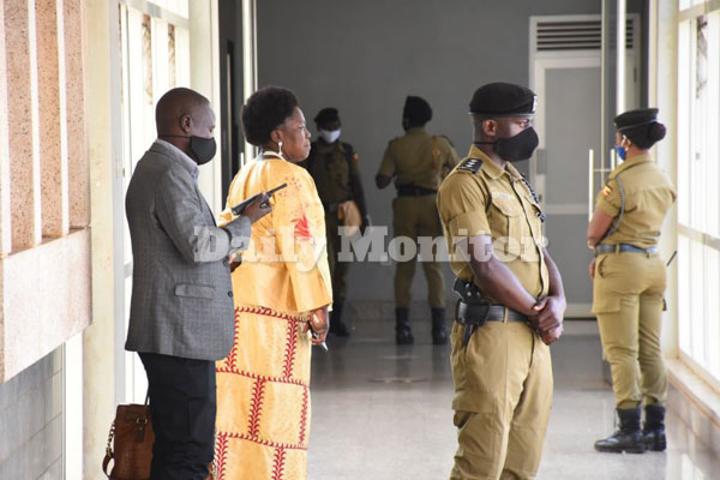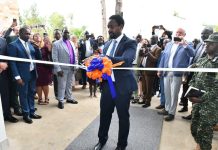Africa-Press – Uganda. In a crowded race for Speaker and Deputy Speaker, the variables are many, but one clearly stands out, the trappings of power that come with the mace.
The mace is a symbol of the House, and represents the Speaker’s authority. Without it, Parliament can’t sit or pass laws. It is a silver gilt ornamental club of about five feet in length, denoting authority, which the State has vested in the Speaker.
Other than the Speaker’s mace, there are many benefits that come with the position. From remuneration and influence to job satisfaction; and from future prospects to the paraphernalia that animates the third highest office in the land.In the pecking order of power or national order of precedence, the Speaker is number three in the country while the deputy is in fifth position.
The emoluments of the Speaker and Deputy slightly differ but do not tell the whole story since their roles come with extras such as special annual budget provision, a private car budgeted at Shs313m (once every after five years), additional four official government vehicles-Mercedes Benz, limousine, pickup and Subaru lead car; a well-furnished office comprising of a boardroom and a special visitors’ waiting room, a hefty retirement package, special allowances and free medical care, among others.
Budgets
In the Financial Year 2019/20 financial year, the Speaker’s office spent more than Shs3.7b. This same amount [Shs3.7b] was maintained in 2020/21 budget.The money the office receives, according to Parliamentary Commission budget details, runs the office and facilitates Speaker’s travel in-land and abroad, among others.
The Speaker also runs a donation budget and has a Personal Private Secretary (PPs) at a level of a director, a Private Press Secretary and an Aide-de-camp (ADC). The Speaker is also given two secretaries, an official driver, and six security guards.
The Deputy Speaker also runs a Shs2.5b budget and has staff attached to his office just like the Speaker. The 2020/21 budget has the same amount. The Deputy Speaker’s annual budget is, however, less than that of the Leader of Opposition in Parliament (LoP).The LoP is given Shs2.7b annually. Part of the Parliament budget is used to finance Opposition office in Parliament. The money runs a shadow cabinet, among other things. Retirement benefitsThe Parliamentary Pensions (Amendment) (No.2) Act 2011 specifies benefits for a person who ceases to hold the office of the Speaker or Deputy Speaker.The Speaker and Deputy are entitled to a monthly pension equal to 60 per cent of the salary of sitting Speaker, among other benefits.
Besides the monthly pension, a speaker gets a lumpsum payment on retirement (calculated as a sum equal to one year’s salary paid for each term served in office), a four-wheel chauffer driven car (3500-4000cc), two security guards, two domestic servants, free medical care for a retired Speaker and spouse(s) and monthly allowances for utilities of Shs660,000. The cars are replaceable once every five years.
From the calculations of June 29, 2011, former Speaker Edward Ssekandi would get Shs421 million while Speaker Rebecca Kadaga, who was her deputy for 10 years, would be paid Shs417.2 million. The Speaker also chairs the business and appointments committees. These committees have distinct budgets as well as travel opportunities.
In the absence of the Speaker, the deputy steps in as the chair of the committees.In other parliaments, business committee is one of the busiest on account of its mandate.
This committee that determines the schedule of house business, normally at the start of every meeting (start of every house sittings after every recess).However, the business committee rarely meets. For all the five sessions of 10th Parliament, the business committee has not met more than twice.
That leaves the scheduling of business as a prerogative of the Speaker. In Kenya, the business committee meets on a weekly basis.The Speaker also chairs the Parliamentary Commission, which is an executive arm of the House.
Article 87a of the 1995 Constitution establishes a Parliamentary Commission, a body corporate with the responsibility for the organisation and strategic guidance of the Parliament of Uganda.The commission has seven other members, namely, the Leader of Government Business, LoP, the Minister of Finance, Planning and Economic Development, and four Commissioners elected among the Members of Parliament.
The Administration of Parliament Act, 1997 (Also see The Administration of Parliament (Amendment) Act, 2006) provides for the organisation and administration of the Parliament of Uganda and for the employment and remuneration of staff of the Parliamentary Service.
Chairing the Parliamentary Commission comes with extra sitting allowances and other opportunities.The commission sits at least once a quarter and each members is paid Shs5m or more per sitting. The chairperson (Speaker or Deputy) gets honorarium, which is higher. In addition, the Speaker heads the Inter-Parliamentary Union (IPU) and Commonwealth Parliamentary Association chapters.These come with at least four foreign trips a year of about two weeks each. The Speaker has the latitude to select five MPs to join her on those trips.Whenever MPs travel abroad on official duty, each is entitled to $720 (Shs2.6 million) and a Parliament staff earns $540 (Shs1.9million) per night.
Per diem
However, the per diem rates for the Speaker and deputy range from $1,000 (Shs3.6m) to $1,250 (Shs4.5m) per night in decent hotel. This means for two weeks abroad, Speaker or deputy spends in excess of Shs63m.
Some of the beneficiaries under Ms Kadaga include Francis Mwijukye (Buhweju, FDC) Mourine Osoru (Arua Woman, NRM), Latiff Ssebaggala (Kawempe North, NUP) and Elijah Okupa (Kasilo, FDC), among others.The Deputy Speaker heads the lesser European Union Parliament and African Caribbean and Pacific (ACP) Parliamentary Assembly chapter.
A senior legislator described EU-ACP chapter as “a smaller calf” and called IPU- CPA, “a big cash cow” for lucky members. For any MP who spends two week aboard, Parliament spends more than Shs36 million.There are four candidates, including Ms Kadaga (Kamuli Woman, NRM), who is seeking for third term.
Deputy Speaker Jacob Oulanyah (NRM, Omoro) is also vying for Speaker job.Mr Oulanyah is taking on his boss Kadaga who was expected to give way after completing the 10 years.According to sources, Ms Kadaga protested Mr Oulanyah’s bid for Speaker and asked party leadership to allow her complete 10 years just like the former Speaker Edward Ssekandi (2001-2011).
Others in the Speaker race are Kira Municipality MP Ibrahim Ssemuju Nganda (FDC) and the MP- elect Bukoto Central Richard Sebamala (DP).More members are expected to join the race as the contest takes shape.
In 2016, the ruling party’s Central Executive Committee (CEC), which is the supreme organ of the ruling National Resistance Movement, discussed the matter and asked Mr Oulanyah to withdraw from the Speaker race.Mr Oulanyah accepted on understanding that he would take over from Ms Kadaga in 2021.
He later return as Deputy Speaker with 300 votes against Kampala Central MP Muhammad Nsereko who got 115 votes.Former Prime Minister Amama Mbabazi and Ms Rose Namayanja nominated Ms Kadaga who later won a second term with 302 votes in a two-horse race with FDC’s Nathan Nandala Mafabi who managed only 57 votes. Mr Ssemujju Nganda and Ms Betty Nambooze Bakireke nominated Mr Ssekandi for third term as Speaker but he rejected the nomination.The President attended the sitting and witnessed the voting. Deputy speaker raceThe deputy Speaker slot has so far attracted 10 members- all jostling to replace Mr Jacob Oulanyah (pictured right), who is taking on his boss Rebecca Kadaga. The candidates in the race include Ruhinda North MP Thomas Tayebwa, Yusuf Nsibambi (FDC, Mawokota South), State Minister for Planning David Bahati, West Budama North MP Jacob Oboth-Oboth, Gomba West MP Robinah Rwakoojo, Bukedea Woman MP Anita Among, Theodore Ssekikubo, Lwemiyaga County MP, Muhammad Nsereko (Kampala Central, Ind), Philip Polly Okin Ojara (Chua West) and Eric Musana Acaali (Buyaga East, NRM).
Speaker
•Monthly allowance (60% of the salary of sitting )•Four-wheel chauffer driven car (3500-4000cc)•Two security guards•Two domestic servants•Free medical care for retired and spouse(s)•Monthly allowances for utilities (33 currency points)•State funeral and a public holiday•Spouse(s) inherit benefits upon death of the Deputy •Monthly allowance (60% of the salary of sitting Deputy )•Four-wheel chauffer driven car (3500-4000cc)•One security guard•One domestic staff•Free medical care for retired Deputy and spouse(s)•Monthly allowances for utilities (33 currency points)•State funeral and a public holiday•Spouse(s) inherit benefits upon death of Deputy Other benefits for Serving or Deputy 1.Shs313m vehicle (once every after 5 years if re-elected as MP)2.Additional 4 official government vehicles(Mercedes Benz, limousine, pickup and Subaru lead car)3.Travel in-land (Over Shs500,000 per night(per diem)4.Travel abroad ($1,250 per night(per diem)5.Undisclosed monthly/annual salary6.Fuel, lubricants and oils7.Statutory allowances 8.Welfare and Entertainment9.Uniforms, beddings and protective gear10.Printing, Stationary, photocopying and binding11.Personal Private Secretary at a level of a director12.Two secretaries13.Official driver14.A private Press Secretary15.Aide-de-camp (ADC)16.Six security guards17.Books Periodicals, & Newspapers18.Computer supplies and Information Technology19.Telecommunications20.Cleaning and sanitation services21.Motor vehicle maintenance cash22.Maintenance- Equipment & Furniture23.Donation budget






